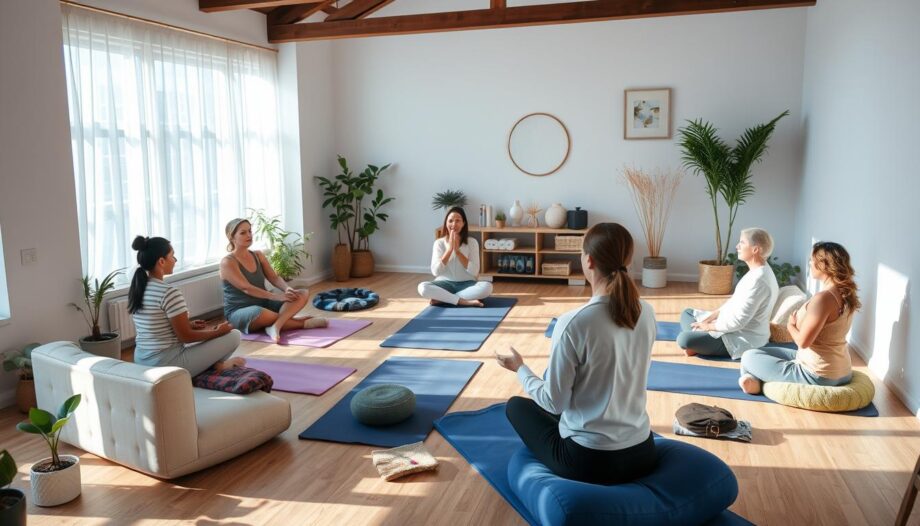Holistic therapy groups offer a unique healing approach. They focus on the links between mind, body, and spirit1. These groups use a comprehensive method for personal wellness2.
Holistic therapy aims to heal the whole person, not just symptoms1. It uses natural healing methods for complete well-being2. This approach effectively treats anxiety, depression, and stress2.
Group sessions blend various healing techniques. These include mindfulness practices, yoga, and expressive arts1. Participants gain self-understanding, boost self-esteem, and improve overall health1.
Holistic therapy groups offer cost-effective wellness solutions2. Benefits include better emotional control, less stress, and increased self-confidence1.
These groups support mental health and personal growth. They provide a path to healing through mind-body-spirit connections2. If you’re seeking comprehensive support, a holistic therapy group might be ideal.
Understanding Holistic Therapy: Mind, Body, and Spirit Connection
Holistic healing is a transformative approach to wellness. It recognises the connections between mind, body, and spirit. This method goes beyond treating symptoms, focusing on the entire human experience3.
Origins and Historical Development
Holistic healing has roots in ancient civilisations. These practices viewed individuals as interconnected systems. Over a hundred different holistic healing practices have been documented3.
- Ancient healing traditions from various cultures
- Philosophical approaches to integrated healthcare
- Emergence of comprehensive wellness models
Core Principles of Holistic Healing
Holistic healing treats the whole person. It uses the Health Hexagon Model with six vital elements. These are diet, sleep, exercise, nature exposure, social connections, and sense of purpose3.
| Element | Significance |
|---|---|
| Diet | Nutritional balance and wellness |
| Sleep | Crucial for physical and mental recovery |
| Exercise | Physical and mental health maintenance |
Modern Applications in Mental Health
Modern mental health practices now include holistic approaches. They combine traditional talk therapy with innovative techniques. These include hypnosis, breath therapy, and meditation4.
These methods address psychological conditions in a new way. They explore how mental, physical, and spiritual health are connected5.
Holistic therapy recognises that healing involves more than just treating symptoms – it’s about nurturing the entire human experience.
Professionals in this field take a comprehensive approach. They consider each person’s unique physical, emotional, and spiritual needs4.
The Rise of Holistic Therapy Group Sessions
Mental health treatment has changed dramatically in recent years. Holistic therapy group sessions have emerged as a powerful healing approach6. These sessions offer a comprehensive method that goes beyond traditional therapeutic practices7.
Group therapy has gained popularity for exploring holistic healing methods collectively8. This approach recognises that mental wellness involves multiple aspects of human experience:
- Physical health
- Emotional well-being
- Spiritual connection
- Social interactions
The pandemic boosted interest in these group sessions. It highlighted the connection between personal health and community well-being6. Participants enjoy significant benefits through this integrated approach.
| Holistic Therapy Benefit | Impact |
|---|---|
| Emotional Resilience | Enhanced coping mechanisms |
| Personal Growth | Increased self-awareness |
| Community Support | Reduced isolation |
Skilled therapists create safe spaces for vulnerability and shared healing experiences8. Group therapy benefits extend beyond individual treatment. It fosters a sense of community and mutual understanding7.
Healing is not a solitary journey, but a collective experience of growth and transformation.
Holistic therapy group sessions represent a progressive approach to integrated healing6. They reflect the evolving awareness of mental health in our society.
Key Components of a Holistic Therapy Group
Holistic therapy groups offer a revolutionary healing approach. These integrated groups focus on multiple aspects of human wellness9. They provide a comprehensive healing experience beyond traditional methods.
Group Dynamics and Interaction
Group dynamics are vital in holistic therapy sessions. Participants engage in collaborative healing processes, fostering mutual support. The group setting allows exploration of emotional challenges1011.
This environment helps develop better communication skills. It also enhances interpersonal connections and shared emotional experiences.
- Enhanced interpersonal connections
- Shared emotional experiences
- Collective problem-solving strategies
Integration of Various Healing Modalities
Holistic therapists use diverse healing modalities for comprehensive treatment9. These may include:
| Healing Modality | Primary Focus |
|---|---|
| Meditation | Mental clarity and stress reduction |
| Yoga | Physical and emotional resilience |
| Breathwork | Emotional regulation |
Role of the Holistic Therapist
The holistic therapist guides and facilitates personalised healing experiences. Their integrated approach considers cognitive, emotional, and physical well-being11.
They create tailored interventions for each participant’s unique needs. This promotes comprehensive healing for the entire person9.
Healing is not just about treating symptoms, but understanding and nurturing the entire person.
Evidence-Based Benefits of Group Holistic Therapy
Research shows group holistic therapy offers profound mental health benefits. It integrates multiple techniques to address individual needs. This approach provides a comprehensive healing experience12.
- Reduction of stress and anxiety13
- Enhanced emotional regulation through mindfulness practices12
- Improved cognitive function12
- Deeper interpersonal connection and support13
Physical health improvements are equally significant. Holistic therapy approaches can address chronic symptoms like tension and headaches12.
| Therapy Technique | Mental Health Impact | Physical Health Impact |
|---|---|---|
| Meditation | Stress Reduction | Lower Blood Pressure |
| Yoga | Anxiety Management | Improved Flexibility |
| Art Therapy | Emotional Expression | Reduced Muscle Tension |
The power of holistic therapy lies in its ability to treat the whole person, not just isolated symptoms12.
Group holistic therapy creates a supportive space for healing through complementary practices13. Participants can develop greater self-awareness and resilience. This is achieved by combining evidence-based therapies with holistic approaches12.
Common Treatment Methods in Holistic Therapy Groups
Holistic therapy groups offer a complete approach to healing. They address the entire person using innovative treatment methods. These techniques support mental, physical, and emotional well-being through integrated therapeutic practices.
Holistic therapy groups create a diverse healing environment. They cater to individual needs and preferences14. These methods typically include five key elements:
- Physical wellness
- Emotional balance
- Social connection
- Spiritual exploration
- Intellectual growth
Mindfulness and Meditation Practices
Mindfulness and meditation are powerful tools in holistic therapy groups. They help participants manage emotions and reduce stress15. These practices also develop greater self-awareness.
A 2017 study showed diaphragmatic breathing can lower stress levels. It can also improve cognitive function15.
Movement-Based Therapies
Yoga and tai chi offer benefits for physical and mental health14. They improve strength, flexibility, and balance. These practices also reduce anxiety and boost mood16.
Expressive Arts and Creative Therapies
Expressive arts therapy provides unique ways for emotional healing. It allows self-discovery through creative activities. Art, music, and dance therapy help explore complex feelings15.
| Therapy Type | Primary Benefits |
|---|---|
| Meditation | Stress reduction, emotional regulation |
| Yoga | Physical flexibility, mental clarity |
| Art Therapy | Emotional expression, self-discovery |
“Holistic therapy embraces the interconnectedness of mind, body, and spirit, offering a truly comprehensive approach to healing.”
Participants can expect a personalised treatment experience. It combines multiple healing methods for a holistic approach16. This ensures personal growth and well-being.
How to Find and Join a Holistic Therapy Group
Finding the right holistic therapy group can change your life. It takes careful research to match your mental health needs. Strategic planning is key to this process.
Here are vital strategies for joining therapy groups:
- Consult local holistic health centres for recommendations
- Explore online directories specialising in holistic mental health services
- Ask healthcare providers about group therapy options
- Check professional counselling networks for specialised groups
Many health centres offer group therapy with expert leaders. These groups often cover various healing approaches.
- Mindfulness practices
- Cognitive behavioural techniques
- Psychotherapeutic interventions
- Holistic wellness strategies17
Pro tip: Always check the group leaders’ credentials. Make sure their approach fits your wellness goals18.
“The right therapy group can be a powerful catalyst for personal transformation and healing.”
Some groups may need an initial assessment. Prices can vary widely between programmes. Some offer flexible payment options.
For example, a full programme might cost £900. Individual sessions could be around £10017.
Your ideal group should feel like a supportive community. It should match your unique healing journey.
What to Expect in Your First Group Session
Your first therapy session can be both thrilling and daunting. Holistic healing practices offer a unique approach to group therapy19. Most groups have eight to twelve participants, fostering an intimate and supportive atmosphere20.
Upon arrival, you’ll receive a warm welcome and introductions. The holistic therapist will guide you through a grounding exercise. This helps participants feel at ease and connected21.
Ground rules for confidentiality and group interactions will be set. These ensure a safe and respectful environment for all.
- Introduction and check-in
- Overview of session goals
- Group dynamics explanation
- Initial wellness assessment
The session may include various healing methods addressing multiple health dimensions:
| Health Dimension | Potential Activities |
|---|---|
| Physical | Gentle movement or breathing exercises |
| Emotional | Guided meditation or sharing |
| Mental | Cognitive awareness practices |
| Spiritual | Reflective journaling or mindfulness |
Remember, feeling nervous is perfectly normal. The group aims to create a supportive, non-judgmental space. Here, you can focus on healing and personal growth19.
“Holistic therapy considers your entire being, not just isolated symptoms” – Wellness Expert
Conclusion
Holistic therapy groups offer a game-changing approach to mental health and personal growth. These sessions address wellness comprehensively, targeting the mind, body, and spirit22. With one in five American adults facing mental health challenges, these supportive environments are vital for healing22.
The benefits of holistic therapy groups go beyond traditional treatments. Interpersonal support improves mental health by reducing stress and boosting personal resilience22. Participants learn powerful self-regulation tools through collaborative practices that address wellness from various angles.
While some patients may experience limited benefits from certain therapies23, holistic groups offer a more complete alternative. These groups create spaces where healing surpasses traditional medical models. Ongoing research suggests these approaches will transform our understanding of mental health22.
The future of mental health care embraces holistic, interconnected methods. These innovative therapy groups unlock profound paths to healing and self-understanding. They recognise the complex nature of human experience, paving the way for personal transformation.
FAQ
What exactly is a holistic therapy group?
A holistic therapy group is a supportive healing space. It addresses a person’s mind, body, and spirit all at once. These groups use various methods like meditation and yoga to boost overall wellness.
How do holistic therapy groups differ from traditional therapy?
Holistic therapy groups take a whole-person approach. They blend physical, emotional, mental, and spiritual practices. This method aims to tackle the root causes of issues.
Are holistic therapy groups scientifically proven to be effective?
Yes, research has shown positive results from holistic therapy groups. A 2019 study found reduced stress, anxiety, and depression in participants. Other studies note improvements in mental health and overall well-being.
What types of healing methods are typically used in these groups?
These groups often use a mix of healing techniques. These may include mindfulness meditation, yoga, tai chi, and breathwork. Acupuncture, sound healing, and creative arts therapy are also common.
Who can benefit from holistic therapy groups?
Many people can gain from these groups. This includes those dealing with stress, anxiety, depression, or addiction. People with trauma, chronic pain, or seeking personal growth may also benefit.
How can I find a reputable holistic therapy group?
You can search online directories or ask local health centres. Healthcare providers may offer referrals. Mental health experts can also suggest integrative approaches.
Always check the facilitator’s qualifications. Make sure the group’s approach fits your personal goals.
What should I expect in my first holistic therapy group session?
First sessions usually cover the group’s format and rules. You’ll likely join in a check-in exercise. Guided activities like meditation or group talks are common.
Expect a supportive, non-judgmental atmosphere. The focus is on creating a safe space for all.
Are holistic therapy groups covered by health insurance?
Coverage varies by insurance provider and policy. Some plans are starting to recognise holistic therapies. It’s best to check with your provider about possible coverage options.
Can I participate in a holistic therapy group if I have no prior experience with alternative healing methods?
Absolutely! Most groups welcome participants of all experience levels. Leaders are skilled at introducing new techniques. They create an inclusive space for learning and growth.
How frequently do holistic therapy groups typically meet?
Group sessions can vary in frequency. Many meet weekly or every other week. Some intensive programmes might offer daily or weekend-long sessions.
The schedule depends on the group’s focus and participants’ needs. You can choose a group that fits your availability.





